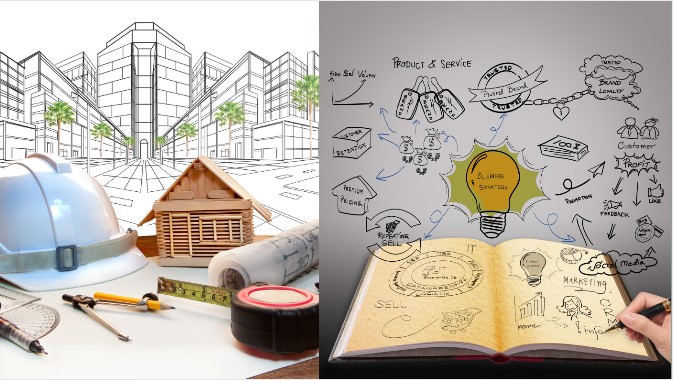
CRM software is becoming an invaluable asset for those new to the construction business, offering a comprehensive suite of tools designed to enhance operational efficiencies, client engagement, and project management. This blog post aims to provide essential insights into how CRM solutions can be leveraged by newcomers in the construction industry to foster robust business growth and streamline complex processes.
From automating customer interactions to facilitating seamless project tracking and data management, CRM software stands as a cornerstone for building strong client relationships and ensuring project success. By integrating these insights into your business strategy, you can significantly improve communication, efficiency, and overall customer satisfaction, positioning your construction enterprise for long-term success in a competitive market.
Introduction to CRM software in Construction
Customer Relationship Management (CRM) is becoming increasingly vital in the construction industry, where building strong relationships with clients, suppliers, and stakeholders is key. As a new construction professional, understanding CRM’s role can give you a competitive edge, helping manage projects more efficiently while enhancing client satisfaction.
CRM (Customer Relationship Management) software is a versatile tool designed to enhance customer service operations across a wide range of business areas, professions, and contractor roles, especially within the construction industry. Here’s a comprehensive list of those who can greatly benefit from using CRM software:
Business Areas:
- Sales & Business Development: For managing client relationships, tracking leads, and analyzing sales data to improve performance.
- Project Management: Utilizing CRM to keep projects on schedule, within budget, and ensure client requirements are met.
- Marketing: To segment customers, personalize marketing efforts, and track campaign effectiveness.
- Customer Support: For handling inquiries, complaints, and feedback efficiently, ensuring high levels of customer satisfaction.
- Contract Management: Managing agreements with clients and contractors, including terms, conditions, and renewal dates.
- Quality Assurance: Monitoring service quality and client feedback to continuously improve offerings.
- Field Service Management: Scheduling and managing on-site visits, maintenance, and installations.
- Billing and Invoicing: Streamlining the invoicing process and tracking payments.
Professions:
- Construction Managers: Overseeing project execution and using CRM to improve client communication and project outcomes.
- Sales Executives: Focused on building relationships with potential clients and closing deals with the aid of CRM insights.
- Customer Service Representatives: Providing personalized support and resolving issues based on comprehensive client histories.
- Marketing Specialists: Developing targeted campaigns based on CRM data to attract new clients and retain existing ones.
- Project Coordinators: Ensuring project milestones are met and facilitating communication between all parties involved.
Contractors:
- General Contractors: Managing multiple projects and client interactions, ensuring all parties are updated.
- Subcontractors: Utilizing CRM for efficient communication with general contractors and tracking project specifics.
- Specialty Contractors: For specific trades (e.g., electrician, plumber, roofer, handyman), using CRM to manage client requests, project details, and follow-up services.
- Consultants: Advising on projects and using CRM to manage client engagements, appointments, and service offerings.
- Suppliers & Vendors: Managing orders, deliveries, and customer service interactions to ensure timely project execution.
CRM software is instrumental in streamlining operations, enhancing customer satisfaction, and driving business growth. By adopting CRM solutions, those in the construction industry—from business managers to contractors—can improve project outcomes, foster stronger client relationships, and achieve operational excellence.
Table of Contents
The Importance of CRM for New Construction Professionals
CRM software systems are not just for managing customer data; they’re about building and maintaining relationships. For new construction pros, this means better project oversight, streamlined communication, and improved customer service, leading to repeat business and referrals.
Key Features of a Construction CRM software
A construction-specific CRM system offers features tailored to the industry’s unique needs, such as project tracking, bid management, and client communication tools. Understanding these features can help you leverage CRM software to its fullest potential.
Implementing CRM in Your Construction Business
Choosing and implementing the right CRM system can seem daunting, but by following a few key steps, you can make the process smoother and more effective.
Steps to Choose the Right CRM
Consider your business needs, budget, and the CRM’s scalability. Look for systems with construction-specific functionalities to ensure they align with your project management processes.
Integrating CRM with Existing Systems
Seamless integration with your current software and tools is crucial for maximizing efficiency. Ensure the CRM software you choose can integrate with your existing systems, such as accounting and project management software.
Best Practices for Using CRM in Construction
Effective CRM use goes beyond software implementation. It involves managing client information meticulously, enhancing communication with clients, and tracking projects proactively.
Managing Client Information
A CRM system allows you to store and manage all client information in one place, making it accessible to your team. This ensures everyone is on the same page and can provide personalized service.
Enhancing Communication with Clients
Use CRM software tools to maintain regular, transparent communication with your clients. This builds trust and can help avoid misunderstandings, leading to better project outcomes.
Tracking and Managing Projects
CRM Software systems can help you track project progress, manage budgets, and stay on schedule. This visibility allows for better decision-making and project management.
Overcoming Challenges with CRM in Construction
Implementing a new system comes with challenges, such as ensuring data security and getting your team to adopt the new tool. Address these challenges head-on with proper training and a focus on security.
Data Security and Privacy Concerns
With sensitive client and project data stored in your CRM software, ensuring its security is paramount. Choose a CRM with robust security features and train your team on data privacy best practices.
User Adoption and Training
The success of a CRM system depends on your team’s willingness to use it. Offer comprehensive training and highlight the benefits of the CRM to encourage adoption.
The Future of CRM in Construction
As technology advances, the role of CRM Software in construction is set to grow. Staying informed about these changes can help you adapt and stay ahead.
Technological Advancements and CRM
Emerging technologies like AI and machine learning are making CRMs more powerful, offering predictive insights and automation that can streamline your operations.
Predictions for CRM Trends in Construction
Expect CRM software systems to become more integrated with other tech tools, offering even greater efficiencies and insights into your business operations.
Conclusion
For new construction professionals, embracing CRM is no longer optional; it’s a necessity for staying competitive. By understanding and implementing a CRM software system tailored to your needs, you can enhance client relationships, streamline project management, and ultimately, grow your business.
FAQs about CRM software
Question 1: What are the benefits of using CRM in construction?
Answer 2: Improved customer relationships, streamlined project management, efficient communication, enhanced collaboration, better data management, increased productivity, improved sales and marketing efforts, and effective decision-making. Implementing Customer Relationship Management (CRM) software in the construction industry offers a multitude of benefits that can significantly enhance operational efficiency and customer satisfaction. Here are some key advantages:
Enhanced Project Management: CRM software allows construction professionals to track every aspect of a project, from initial bidding to final delivery. It facilitates better scheduling, budget management, and resource allocation, ensuring projects are completed on time and within budget.
Improved Customer Relationships: By centralizing customer information, CRM Software systems enable construction companies to offer personalized communication and service. This tailored approach helps in building strong, lasting relationships with clients, leading to increased satisfaction and loyalty.
Streamlined Communication: With CRM, all communication — emails, calls, meetings, and notes — can be tracked and stored against customer records. This ensures that team members are up-to-date on client interactions, reducing misunderstandings and enhancing teamwork.
Data-Driven Decision Making: CRM tools provide valuable insights into customer behavior, project performance, and business trends. This data can inform strategic decisions, helping construction firms to identify opportunities for growth and improvement.
Increased Efficiency and Productivity: Automating routine tasks, such as follow-ups and reporting, saves time and reduces the risk of human error. This increased efficiency can significantly boost overall productivity, allowing teams to focus on more strategic activities.
Better Lead Management: CRM software helps in efficiently managing leads and prospects. It enables construction companies to nurture potential clients through the sales funnel more effectively, improving conversion rates and driving business growth.
Enhanced Collaboration: By providing a centralized platform for storing and sharing information, CRM Software systems improve collaboration among team members, as well as with clients and subcontractors. This fosters a more cohesive working environment and ensures that everyone is aligned with project goals and timelines.
In conclusion, adopting CRM software in the construction industry not only streamlines project management and operations but also strengthens client relationships and drives business growth. It’s an investment that can lead to significant returns through improved efficiency, enhanced customer satisfaction, and increased profitability.
Question 2: How can CRM improve client satisfaction?
By improving communication, streamlining processes, and personalizing interactions, CRM can enhance client satisfaction. CRM (Customer Relationship Management) software plays a pivotal role in enhancing client satisfaction within the construction industry through several key mechanisms:
Personalized Client Interactions: CRM systems store detailed information about clients, including past interactions, preferences, and project history. This enables construction businesses to tailor their communication and services to meet individual client needs, fostering a sense of understanding and personal care.
Streamlined Communication: By centralizing client communications, CRM ensures that all messages, emails, and notes are easily accessible to the team. This facilitates consistent and prompt responses to client inquiries, updates, and concerns, reducing the chances of miscommunication and enhancing the client experience.
Proactive Problem Resolution: CRM Software tools allow companies to track client feedback and issues in real-time. This capability enables businesses to address and resolve problems promptly, often before the client is significantly impacted, thus maintaining high levels of client satisfaction.
Efficient Project Management: With features designed to manage project timelines, budgets, and resources, CRM software helps ensure projects are delivered on time and within the agreed parameters. Timely project completion and transparency in project management are key to client satisfaction.
Enhanced After-Sales Support: CRM systems facilitate ongoing support and engagement with clients even after project completion. Through regular updates, maintenance tips, and quick resolution of post-project queries, construction companies can continue to add value, reinforcing a positive client relationship.
Feedback Loop for Continuous Improvement: By collecting and analyzing client feedback, CRM software helps businesses understand client needs and preferences better. This information can be used to make informed improvements to services, processes, and communication strategies, directly contributing to increased client satisfaction over time.
In summary, CRM software enhances client satisfaction in the construction industry by personalizing client interactions, streamlining communication, proactively resolving issues, efficiently managing projects, providing excellent after-sales support, and leveraging client feedback for continuous improvement.
Question 3: What should I look for in a construction CRM?
Answer 3: When selecting a CRM (Customer Relationship Management) system for a construction business, it’s essential to consider features and capabilities that align with the unique demands of the industry. Here are key factors to look for in a construction CRM:
Project Management Integration: The CRM Software should seamlessly integrate with project management tools or include built-in features for tracking projects from inception to completion. This includes managing timelines, budgets, resources, and progress updates.
Customizable Workflow Automation: Construction projects can vary greatly, so a CRM that allows for customizable workflows helps ensure that you can tailor the software to fit the specific needs of different projects.
Client and Contact Management: Effective management of client information, including contact details, communication history, project specifics, and preferences, is crucial. The CRM should offer an organized and accessible way to store and manage this data.
Communication Tracking: Look for a CRM that facilitates tracking of all communications with clients, suppliers, and team members. This includes emails, calls, meetings, and notes, ensuring that everyone involved has access to the latest information.
Document Management: The ability to store, share, and manage important project documents and contracts within the CRM is vital. This feature should support version control and access permissions to keep sensitive information secure.
Mobile Accessibility: With construction teams often working on-site, a mobile-friendly CRM ensures that they can access information and update project details in real-time from any location.
Integration Capabilities: The CRM Software should integrate well with other tools and software commonly used in the construction industry, such as accounting, bidding, and scheduling applications, to streamline operations and avoid data silos.
Reporting and Analytics: Advanced reporting and analytics features help in tracking project performance, forecasting, and making data-driven decisions. Look for a CRM that offers customizable reports and dashboards.
User-Friendly Interface: Since adoption rates are crucial for the success of any new software implementation, selecting a CRM with an intuitive and easy-to-navigate interface will help ensure your team actually uses it.
Scalability: As your construction business grows, your CRM should be able to scale with you, accommodating more projects, clients, and users without compromising performance.
Support and Training: Ensure that the CRM provider offers comprehensive support and training resources to facilitate a smooth transition for your team and ongoing assistance when needed.
Security Features: Given the sensitive nature of construction projects and client data, robust security features are non-negotiable. This includes data encryption, access controls, and regular security updates.
Choosing a construction CRM that aligns with these criteria can significantly enhance operational efficiency, improve client relationships, and drive project success.
Question 4: How does CRM integrate with other construction tools?
Answer 4: CRM (Customer Relationship Management) software integration with other construction tools is a critical factor for enhancing efficiency, streamlining workflows, and ensuring that all aspects of a construction project are aligned and easily manageable. Here’s how CRM Software can integrate with other tools and the benefits of such integration:
Seamless Data Flow: CRM systems can integrate with construction project management tools, accounting software, scheduling applications, and more. This integration allows for a seamless flow of data across platforms, eliminating the need for manual data entry and reducing the risk of errors. For instance, client information from the CRM can automatically populate in project management tools, ensuring consistency across documents and communications.
Centralized Information Hub: By integrating with various construction tools, CRM becomes a centralized hub for all project-related information. This means that updates made in scheduling or project management software are reflected in the CRM, providing team members with real-time access to the most current project details, client communications, and financial data.
Enhanced Collaboration and Communication: Integration facilitates better collaboration and communication among team members, subcontractors, and clients. With shared access to project timelines, tasks, and updates, everyone involved can stay on the same page, leading to more efficient project execution and client satisfaction. Financial Analyst
Improved Project Visibility and Control: Integrating CRM Software with construction tools provides managers and stakeholders with a comprehensive view of project statuses, financials, and client interactions. This improved visibility allows for more informed decision-making, better resource allocation, and proactive problem resolution.
Automated Workflows: Integration enables the automation of workflows between different software applications. For example, when a new client is added to the CRM, it can trigger the creation of a new project in project management software, automatically assign tasks based on predefined templates, and initiate billing schedules in accounting software.
Customizable Reports and Analytics: With data from various tools centralized in the CRM, businesses can generate more comprehensive and customizable reports. This integration allows for deeper insights into project performance, profitability, client satisfaction, and overall business health, enabling strategic planning and forecasting.
Streamlined Scheduling and Resource Management: CRM integration with scheduling and resource management tools helps ensure that the right resources are allocated to the right projects at the right time. It can provide alerts for scheduling conflicts, overbooked resources, or upcoming deadlines, helping to keep projects on track.
Enhanced Customer Service: Integrating CRM with customer service tools, such as ticketing systems or customer portals, ensures that all client interactions and issues are tracked and managed efficiently. This leads to quicker response times, more effective resolution of client issues, and overall improved client relationships.
In summary, integrating CRM Software with other construction tools not only streamifies operations and improves project management but also enhances client relationships and provides strategic insights into business performance. For construction businesses looking to maximize efficiency and project success, leveraging these integrations is essential.
Question 5: What are the common challenges of implementing CRM in construction, and how can they be overcome?
Answer 5: Implementing a Customer Relationship Management (CRM) system within the construction sector can encounter several challenges, each stemming from the unique nature of the industry, the diversity of projects, and the varying levels of technology adoption among staff. Here are some of the common hurdles and effective strategies to overcome them:
User Adoption Resistance: One of the primary challenges is resistance from employees who are accustomed to traditional methods of managing client relationships and project data. This resistance often arises from a fear of the unknown or a belief that new systems will complicate their workflow.
Solution: To encourage user adoption, it’s crucial to involve key team members in the CRM selection process, ensuring the chosen system meets the actual needs and workflows of your team. Providing comprehensive training and demonstrating the tangible benefits, such as time savings and reduced manual errors, can also help alleviate concerns and encourage acceptance.
Data Migration Complexities: Migrating existing client and project data into a new CRM system can be a daunting task, especially if data is spread across disparate systems or stored in non-digital formats.
Solution: Start with a thorough audit of your current data to identify what needs to be transferred. Employ data cleansing practices to ensure only accurate and necessary data is migrated. Consider using professional data migration services if the volume or complexity exceeds your team’s capabilities.
Integration with Existing Systems: Ensuring the new CRM Software software integrates seamlessly with existing construction management tools, accounting software, and other digital tools is vital for streamlining workflows and avoiding data silos.
Solution: Prioritize CRM solutions that offer flexible integration capabilities or APIs that work well with the software already in use within your company. This may involve working closely with CRM and software vendors to create a seamless integration plan.
Customization and Scalability: Finding a CRM system that can be customized to fit the unique needs of different construction projects, and that can scale as your business grows, can be challenging.
Solution: Opt for CRM platforms that offer high levels of customization and are known for their scalability. This might mean choosing a CRM that provides industry-specific features or one that allows for extensive customization through add-ons or modular components.
Training and Support: Properly training staff to use the new CRM system effectively can be time-consuming, and ongoing support is often necessary to address new questions or problems as they arise.
Solution: Choose a CRM provider that offers robust training materials, such as online tutorials, webinars, and documentation, as well as responsive customer support. Consider appointing internal CRM Software champions within your team who can provide peer support and encouragement.
Cost Concerns: The initial and ongoing costs of implementing and maintaining a CRM system can be a significant concern, especially for smaller construction firms.
Solution: Conduct a cost-benefit analysis to understand the ROI of the CRM system. Look for CRM solutions with pricing models that match your business size and usage needs, considering not just the initial investment but also the long-term benefits in efficiency, customer satisfaction, and project success.
By anticipating these challenges and implementing proactive strategies to address them, construction companies can significantly increase their chances of a successful CRM implementation, leading to improved operational efficiency, enhanced client relationships, and greater project success.







